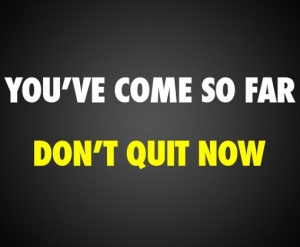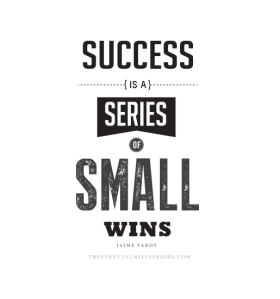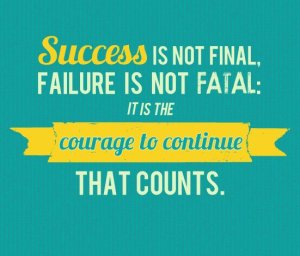 Most people tell you to learn from your failures. I’m saying that it’s important to reflect on your failures to understand where you went wrong, and I’ve even talked about it in great length in the past, but it’s equally important to focus on your successes too.
Most people tell you to learn from your failures. I’m saying that it’s important to reflect on your failures to understand where you went wrong, and I’ve even talked about it in great length in the past, but it’s equally important to focus on your successes too.
While failure can teach you what NOT to do next time, success teaches you about what works and what you need to continue to do. However, don’t be blinded by success and forget that things can and will change, and you’ll need to adapt. Next time you close a deal or make a decision that grows your bottom-line, keep these tips in mind to continue your winning-streak.
Self-Reflect and Give Credit – When it comes to failure, we often look elsewhere to determine how something went wrong. But when it comes to success, we often credit ourselves. Reflect on what you did well and when it is appropriate apply the same methods. Equally as important, give credit where credit is due. Key players in your success need to be acknowledged and appreciated. It’s not only best practice but it will also help motivate your employees to drive success in the future.
That’s Good But It Could Be Great – Yes, you’ve accomplished something great but there is always something you could have done better. Pick apart the process of your success and try to find areas of improvement to make your next move stronger. It may be the timing of your deal or not negotiating enough. Either way, dig deeper.
Discuss Success With Your Team – Gather feedback from your team to ensure you have a rounded perspective. What you think may have went well, may have been perceived differently from your team. Engage in active listening when receiving feedback and let your guard down. Allowing your team to participate in the construction of future success will help grow a stronger team with commitment to your future action plan.
Celebrate Your Success – Don’t forget to celebrate. The team has worked so hard for this and you all deserve some fun. If you’re consistently successful but you never get to enjoy it, your success won’t be sustainable. Employees don’t want to work in a team where their success is not rewarded while being pushed to grow future success. Make hard work worth it – reward yourself and your team.
Overall, don’t be blinded by success but remember to enjoy it. Every milestone in your company can be learned from so it’s important to take the time to recognize it. Whether it is success or failure, get to the root cause of it with your team.

 The summer holidays are winding down, meaning that the hustle and bustle of regular office life will be coming back into most organizations come September. Our offices here at the
The summer holidays are winding down, meaning that the hustle and bustle of regular office life will be coming back into most organizations come September. Our offices here at the  Whether you only have one employee or 50 employees, execution will always be difficult. By execution I mean of course the way that you are completing tasks that will grow your business, and deliver positive results either to your leadership in the company or to yourself.
Whether you only have one employee or 50 employees, execution will always be difficult. By execution I mean of course the way that you are completing tasks that will grow your business, and deliver positive results either to your leadership in the company or to yourself. Congratulations to Germany – they clearly played better than the other teams this World Cup, and their dominance will be discussed for a long time to come. One of the things that will clearly be a talking point for quite a while is their dramatic win over Brazil.
Congratulations to Germany – they clearly played better than the other teams this World Cup, and their dominance will be discussed for a long time to come. One of the things that will clearly be a talking point for quite a while is their dramatic win over Brazil. By nature, an entrepreneur runs head first into things regardless of the risk, meaning that sometimes we make mistakes that make us want to quit. Though it’s hectic and overwhelming, especially when dealing with multiple businesses, you need to learn to move past these small missteps to truly succeed.
By nature, an entrepreneur runs head first into things regardless of the risk, meaning that sometimes we make mistakes that make us want to quit. Though it’s hectic and overwhelming, especially when dealing with multiple businesses, you need to learn to move past these small missteps to truly succeed. In my blog post
In my blog post  There’s a big misconception when it comes to failure. Ever since we’ve been children, we’ve seen that failing is nothing but a negative experience. Teachers would be disappointed and parents would yell at you for failing a test. If you failed a course, you’d use up your valuable summer time taking make-up courses. There has always been negativity associated with failure.
There’s a big misconception when it comes to failure. Ever since we’ve been children, we’ve seen that failing is nothing but a negative experience. Teachers would be disappointed and parents would yell at you for failing a test. If you failed a course, you’d use up your valuable summer time taking make-up courses. There has always been negativity associated with failure.